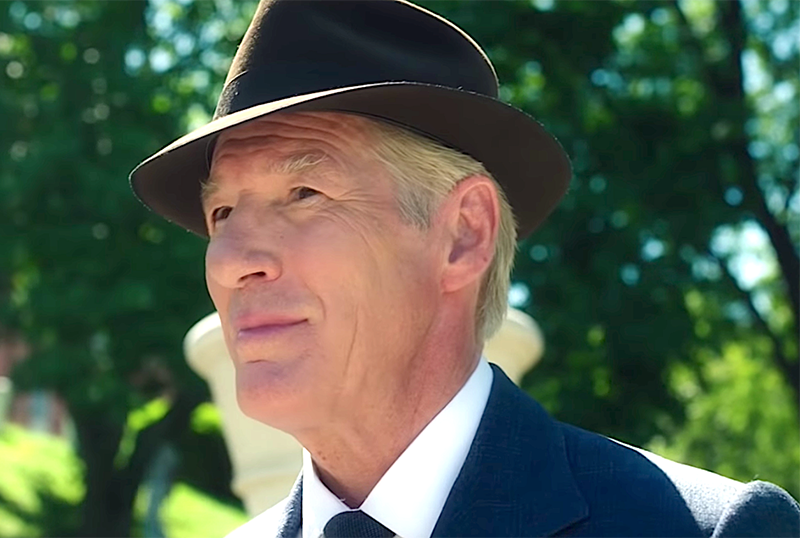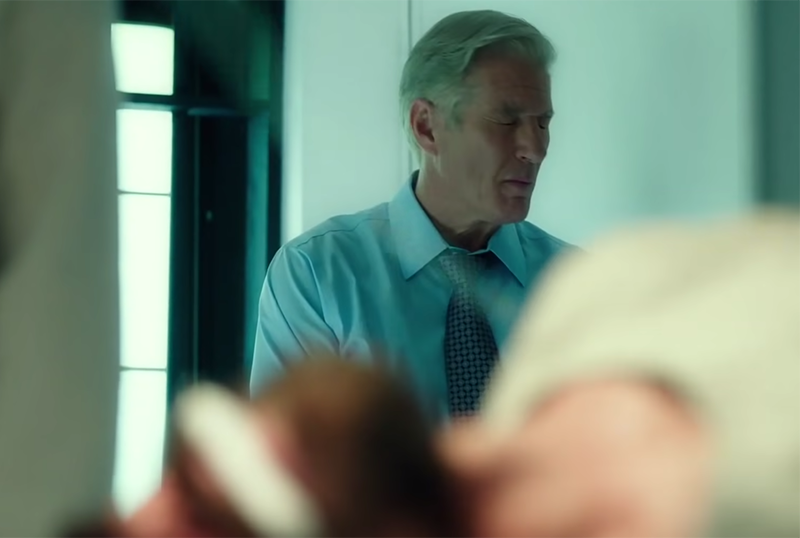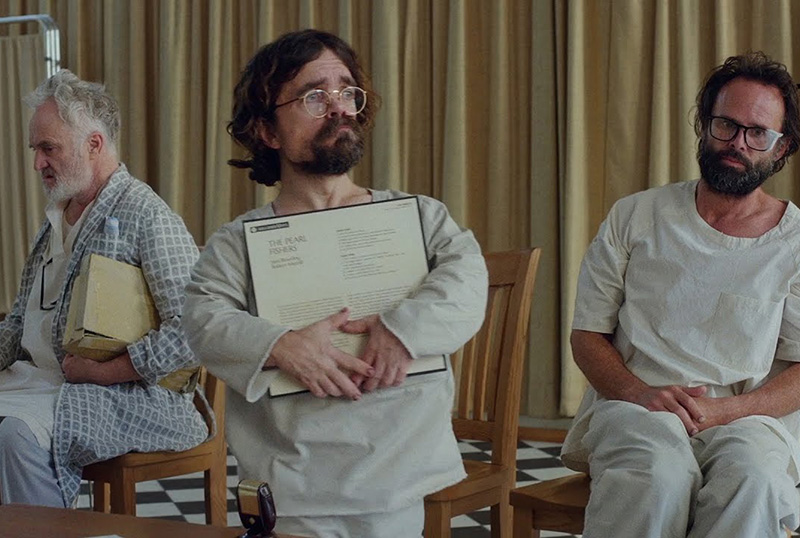The time is finally almost here for the biographical dramedy Three Christs to make its way to the big and small screens and ComingSoon.net got the chance to talk with co-writer/director Jon Avnet (Fried Green Tomatoes) about bringing the controversial case study to life and the importance of properly depicting paranoid schizophrenia in film and TV.
Based on the case study Three Christs of Ypsilanti by psychologist Milton Rokeach, the film follows Dr. Alan Stone as he heads to Ypsilanti State Hospital in Michigan and begins a study of three paranoid schizophrenics who all claim they are Jesus Christ, albeit each displaying very different characteristics and delusions. As he works to help break them of these delusions, he also pushes back against a medical system that would rather go for more barbaric tactics to try and cure them.
Richard Gere (Pretty Woman) leads the cast as Stone that also includes Peter Dinklage (Game of Thrones), Walton Goggins (The Righteous Gemstones) and Bradley Whitford (Get Out) as the three patients, Juliana Margulies (The Good Wife) as Stone’s wife, Kevin Pollak (The Usual Suspects) as Dr. Orbus, Stephen Root (Get Out) as Dr. Rogers and Jane Alexander (The Good Fight) as Dr. Abraham.
Avnet directed the film on a script he wrote with The Blue Hour‘s Eric Nazarian and also produces the project alongside Daniel Levin, Molly Hassell, and Aaron Stern. The film originally premiered at the 2017 Toronto International Film Festival and is set to hit select theaters and VOD on January 10.

Three Christs acts as a reunion between the 70-year-old filmmaker stars Gere and Whitford with whom he worked on the 1997 mystery thriller Red Corner, and Avnet thought the project was perfect to get the trio back together.
“I love working with Richard and I thought he had a great quality for the doctor, which was he’s a very empathic person,” Avnet said. “I hadn’t seen him in a role like that, so I thought he might be good for it. He read the script and he was extremely complimentary about it and we began to work on it together for a year, maybe 15 months before we started shooting. Bradley I had worked with multiple times, he’s a wonderful guy, very funny and a great actor. He actually heard about it and called me and wanted to play Clyde, so we talked about it and I thought well aren’t I the lucky guy that I get to have Bradley? He’s so good.”
One of the things Avnet envisioned while developing the script was exploring each character as a different aspect of what Christ would’ve been in the Bible, saying that much of the dichotomy actually comes from the real material itself.
“The characters came from the book and came from the study and I actually was able to get the transcripts so I had more information than was just in Dr. Rokeach’s book,” Avnet said. “They each carved out an identity and each one had a different aspect of Christ. Part of this all came about because I worked with Martin Scorsese on The Last Temptation of Christ from the first incarnation of it, so I got to hear Marty talk a lot about Christ, about various qualities and what he was trying to do with [Nikos] Kazantzakis’ book, so that influenced me quite a bit as well.”
RELATED: CS Interview: Director Larry Fessenden on Frankenstein Tale Depraved
While Avnet wasn’t able to talk to any of the real people involved, as the patients’ names were both fictionalized and are deceased, but the one person he did get to speak to with whom he found “most interesting” was Dr. Sandra Ball-Rokeach, Milton’s wife.
“That was quite a humbling experience because a number of screenwriters had approached her over the years, and some of them were brilliant screenwriters, Academy Award-winnings screenwriters,” he said. “They all failed in her eyes and it didn’t get made. So when I came, she assumed I would fail as well, since I had much less pedigree, although I did co-write Fried Green Tomatoes, uncredited, which was at least nominated for an Academy Award. But she was very dubious and so we did talk about the experiment, we talked about Dr. Rokeach, talked about a lot of the aspects. This is one story that thankfully for me had a happy ending because when she saw the film, she just loved it. That was probably the most meaningful compliment that I could get because I wanted to capture his spirit and capture what he did, good and bad. Obviously he crossed the line, it’s very clear he crosses the line and it’s very clear he’s aware of it. 20 years after, he wrote an afterward where he excoriated himself for his tactics, but I think he was actually a little too hard on himself, because what I think he accomplished was quite amazing and brilliant, although his methods were not acceptable, nor would they be acceptable today.”
As the novel unveiled many controversial elements of the case study, Avnet felt it was important to “go as far as I could to show both sides” in the tactics used to try and break them of their delusions, because it helps tie into the question of “is giving hope when hope is unlikely unethical?”
“He really was hard on himself with Jane Alexander’s character and I wanted to do that and I wanted you to understand that treating paranoid schizophrenics is extremely difficult,” he said. “But he gave them a number of things that were remarkable, they formed a relationship with him and each other. This is very, very rare that it happens because it’s a primary narcissism, paranoid schizophrenia, and it’s very difficult to get close to them physically and certainly emotionally. So the question I ask is, is it worth it or not? I’m happy for the audience to judge, but I did want to point out as many faces of what the descent was and in many ways, what he says to assistant Becky in the first scene is exactly what happens to her and him.”

In order to properly tell the story of these patients, Avnet worked with psychoanalyst Dr. Aaron Stern on the script to make it as accurate as possible, as he “didn’t want to pretend that what he did was right or wrong,” and wanted to allow audiences to draw their own conclusions while still being entertained, as the trio are “brilliant and they’re funny and they’re erratic.”
“They’re just like you and me, in some way, they are not cogs that should be warehoused and drugged and shocked indiscriminately,” he said. “The key is to laugh with them, if you ever laughed at them, then I failed. That was the job of the actors, that was the job of me, and when I was finishing it, I’m fortunate to have many very talented filmmakers who watched cuts and are very tough on the material, it’s an enormous value. Many of them were very sensitive about exactly what you were saying, don’t go for the laugh, play the action and hope that you will see them and empathize with them first. As you empathize with them, you may laugh, some of the stuff is quite funny, some of the language is both brilliant and hysterical to me. At the end of the movie, he baptized him as Dr. Dung, that’s right out of the book, what’s dung? It’s the lowest thing on the earth, right, fecal matter and it’s funny but you understand it and you understand that Dr. Stone has been humbled.
Avnet recalled the film’s premiere at Toronto, which was attended by 2200 people, many of whom were “so into these characters,” which he describes as a “humbling experience,” and that while he may not be one of his own favorite writers, he does believe he’s crafted a “pretty effective adaptation” and that he’s been working with the independent financiers to help bring this story to the big screen.
“There were a bunch of offers after Toronto, and I would’ve preferred had this come out, three, four months after it, but it became a very protracted experience, which was extremely difficult for me personally,” he said. “The biggest thing was the actors had been very generous to me, where I would quote Blanche DuBois, ‘I live on the kindness of actors.’ They expect that the work will be good and they will be treated professionally and the delay was very, very tough. It’s not easy to get a film into theaters these days, that’s what I wanted, that’s what the financier wanted, so I thank him for that.”
RELATED: CS Interview: Susan Sarandon on Working with the Scott Brothers
With the film finally heading to screens next month, the main thing Avnet hopes people get out of the film is to not see them as caricatures or as fictitious beings, but rather to remember they are real.
“I wanted them to see these paranoid schizophrenic patients as people, i wanted them to ask themselves the question, you know, who are you and who gets to choose who you can and can’t be,” Avnet says. “That really interested me, how many people can change their name? Women used to change their name when they got married, some do, some don’t now. Is changing your name changing your identity? I wanted to explore that aspect of the mind. It really interested me and I hope that it will be entertaining and provocative.”










